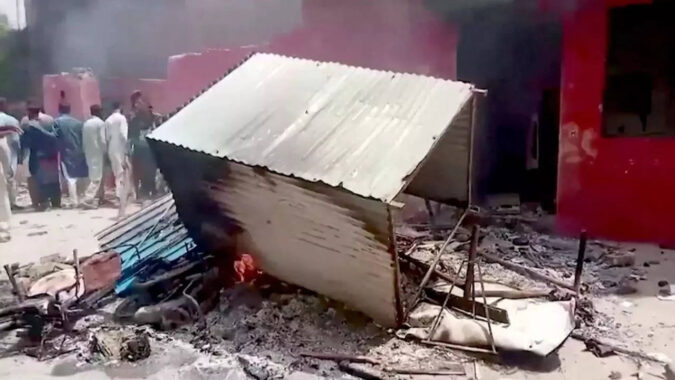The attack took place in Jaranwala in the industrial district of Faisalabad on Wednesday, and continued for more than 10 hours without any intervention by police who were at the scene, residents and community leaders said. Police denied the accusation, saying security forces had prevented an even worse situation.
The rioters were demanding that the two accused men, who had fled their homes, be handed over to them.
Residents said thousands of Muslims led by local clerics were carrying iron rods, sticks, knives and daggers during the rioting.
A provincial government statement said paramilitary troops were deployed to help police control the situation.
The troops have cordoned off the Christian colony, blocking all entry and exit points with barbed wire, according to a Reuters TV cameraman.
Hundreds of Christians took refuge in a nearby district, a community leader Akmal Bhatti told Reuters, adding that four pastors had returned to the churches, which were still smouldering.
He said that at least 50 houses were completely gutted.
“The miscreants dragged heavy goods from the houses and torched them in the streets and took away small valuables which they could carry easily,” Bhatti said.
Rights group Amnesty International called on Pakistani authorities to ensure the protection of minorities.
“The vicious mob attacks are just the latest manifestation of the threat of vigilante violence which anyone can face in Pakistan after a blasphemy accusation,” it said in a statement.
Police had arrested over 100 suspected rioters, the government statement said, adding that an inquiry has been ordered into the incident.
Blasphemy is punishable by death in Pakistan and although no one has ever been executed for it, many accused people have been lynched by outraged crowds. A former provincial governor and a minister for minorities were shot dead because of blasphemy accusations.
Rights groups say accusations of blasphemy are sometimes used to settle scores. Hundreds of people are languishing in prison after being accused of crime because judges often put off trials, fearing retribution if they are seen as being too lenient, according to the rights groups.
The United States was “deeply concerned that churches and homes were targeted,” State Department Deputy Spokesperson Vedant Patel said on Wednesday.
